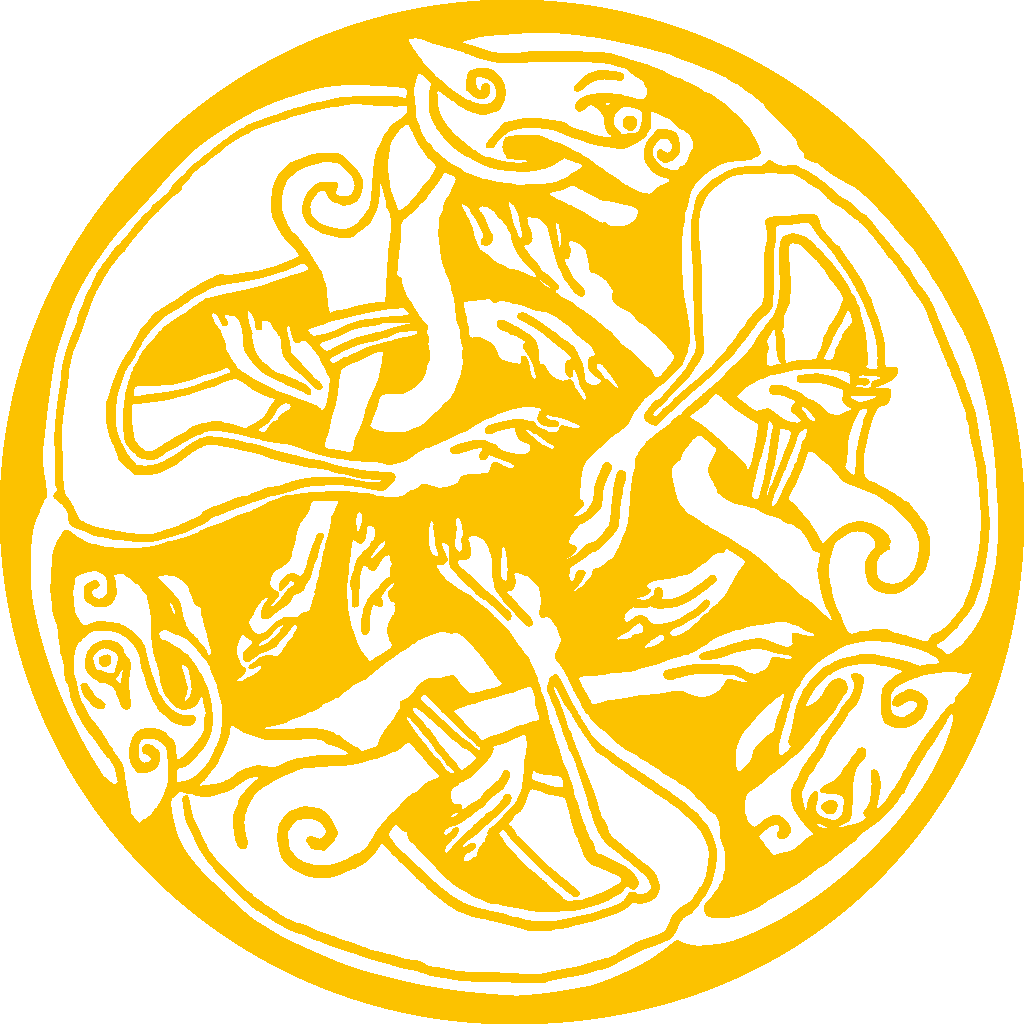History of English - Middle English
Norman Conquest
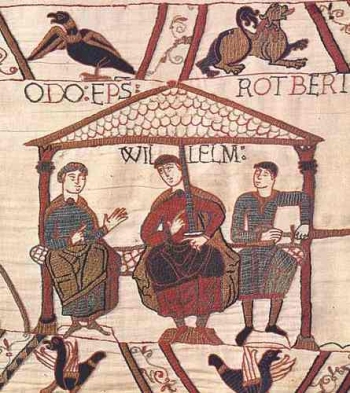
The event that began the transition from Old English to Middle English was the Norman Conquest of 1066, when William the Conqueror (Duke of Normandy and, later, William I of England) invaded the island of Britain from his home base in northern France, and settled in his new acquisition along with his nobles and court. William crushed the opposition with a brutal hand and deprived the Anglo-Saxon earls of their property, distributing it to Normans (and some English) who supported him.
The conquering Normans were themselves descended from Vikings who had settled in northern France about 200 years before (the very word Norman comes originally from Norseman). However, they had completely abandoned their Old Norse language and wholeheartedly adopted French (which is a so-called Romance language, derived originally from the Latin, not Germanic, branch of Indo-European), to the extent that not a single Norse word survived in Normandy.
However, the Normans spoke a rural dialect of French with considerable Germanic influences, usually called Anglo-Norman or Norman French, which was quite different from the standard French of Paris of the period, which is known as Francien. The differences between these dialects became even more marked after the Norman invasion of Britain, particularly after King John and England lost the French part of Normandy to the King of France in 1204 and England became even more isolated from continental Europe.
Anglo-Norman French became the language of the kings and nobility of England for more than 300 years (Henry IV, who came to the English throne in 1399, was the first monarch since before the Conquest to have English as his mother tongue). While Anglo-Norman was the verbal language of the court, administration and culture, though, Latin was mostly used for written language, especially by the Church and in official records. For example, the “Domesday Book”, in which William the Conqueror took stock of his new kingdom, was written in Latin to emphasize its legal authority.
However, the peasantry and lower classes (the vast majority of the population, an estimated 95%) continued to speak English – considered by the Normans a low-class, vulgar tongue – and the two languages developed in parallel, only gradually merging as Normans and Anglo-Saxons began to intermarry. It is this mixture of Old English and Anglo-Norman that is usually referred to as Middle English.
French (Anglo-Norman) Influence
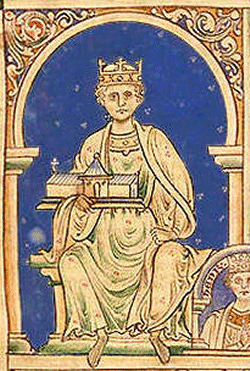
The Normans bequeathed over 10,000 words to English (about three-quarters of which are still in use today), including a huge number of abstract nouns ending in the suffixes “-age”, “-ance/-ence”, “-ant/-ent”, “-ment”, “-ity” and “-tion”, or starting with the prefixes “con-”, “de-”, “ex-”, “trans-” and “pre-”. Perhaps predictably, many of them related to matters of crown and nobility (e.g. crown, castle, prince, count, duke, viscount, baron, noble, sovereign, heraldry); of government and administration (e.g. parliament, government, governor, city); of court and law (e.g. court, judge, justice, accuse, arrest, sentence, appeal, condemn, plaintiff, bailiff, jury, felony, verdict, traitor, contract, damage, prison); of war and combat (e.g. army, armour, archer, battle, soldier, guard, courage, peace, enemy, destroy); of authority and control (e.g. authority, obedience, servant, peasant, vassal, serf, labourer, charity); of fashion and high living (e.g. mansion, money, gown, boot, beauty, mirror, jewel, appetite, banquet, herb, spice, sauce, roast, biscuit); and of art and literature (e.g. art, colour, language, literature, poet, chapter, question). Curiously, though, the Anglo-Saxon words cyning (king), cwene (queen), erl (earl), cniht (knight), ladi (lady) and lord persisted.
While humble trades retained their Anglo-Saxon names (e.g. baker, miller, shoemaker, etc), the more skilled trades adopted French names (e.g. mason, painter, tailor, merchant, etc). While the animals in the field generally kept their English names (e.g. sheep, cow, ox, calf, swine, deer), once cooked and served their names often became French (e.g. beef, mutton, pork, bacon, veal, venison, etc). Sometimes a French word completely replaced an Old English word (e.g. crime replaced firen, place replaced stow, people replaced leod, beautiful replaced wlitig, uncle replaced eam, etc). Sometimes French and Old English components combined to form a new word, such as the French gentle and the Germanic man combined to formed gentleman. Sometimes, both English and French words survived, but with significantly different senses (e.g. the Old English doom and French judgement, hearty and cordial, house and mansion, etc).
But, often, different words with roughly the same meaning survived, and a whole host of new, French-based synonyms entered the English language (e.g. the French maternity in addition to the Old English motherhood, infant to child, amity to friendship, battle to fight, liberty to freedom, labour to work, desire to wish, commence to start, conceal to hide, divide to cleave, close to shut, demand to ask, chamber to room, forest to wood, power to might, annual to yearly, odour to smell, pardon to forgive, aid to help, etc). Over time, many near synonyms acquired subtle differences in meaning (with the French alternative often suggesting a higher level of refinement than the Old English), adding to the precision and flexibility of the English language. Even today, phrases combining Anglo-Saxon and Norman French doublets are still in common use (e.g. law and order, lord and master, love and cherish, ways and means, etc). Bilingual word lists were being compiled as early as the 13th Century.
| Middle English | Modern English |
|---|---|
| Carle li reis, nostre emperere magnes, | Charles the King, our Lord and Sovereign, |
| Set anz tuz pleins ad estét en Espaigne: | Full seven years hath sojourned in Spain, |
| Tresque'en la mer cunquist la tere altaigne. | Conquered the land, and won the western main, |
| N'i ad castel ki in front of him remembers; | Now no fortress against him doth remain, |
| Mur ne citet n'est remés a fear | No city walls are left for him to gain, |
| Fors Sarraguce, it's in a mountain. | Save Sarraguce, that sits on high mountain. |
- 1 Excerpt from 'Le Chanson de Roland'
The pronunciation differences between the harsher, more guttural Anglo-Norman and the softer Francien dialect of Paris were also carried over into English pronunciations. For instance, words like quit, question, quarter, etc, were pronounced with the familiar “kw” sound in Anglo-Norman (and, subsequently, English) rather than the “k” sound of Parisian French. The Normans tended to use a hard “c” sound instead of the softer Francien “ch”, so that charrier became carry, chaudron became cauldron, etc. The Normans tended to use the suffixes “-arie” and “-orie” instead of the French “-aire” and “-oire”, so that English has words like victory (as compared to victoire) and salary (as compared to salaire), etc. The Normans, and therefore the English, retained the “s” in words like estate, hostel, forest and beast, while the French gradually lost it (état, hôtel, forêt, bête).
French scribes changed the common Old English letter pattern “hw” to “wh”, largely out of a desire for consistency with “ch” and “th”, and despite the actual aspirated pronunciation, so that hwaer became where, hwaenne became when and hwil became while. A “w” was even added, for no apparent reason, to some words that only began with “h” (e.g. hal became whole). Another oddity occurred when hwo became who, but the pronunciation changed so that the “w” sound was omitted completely. There are just some of the kinds of inconsistencies that became ingrained in the English language during this period.
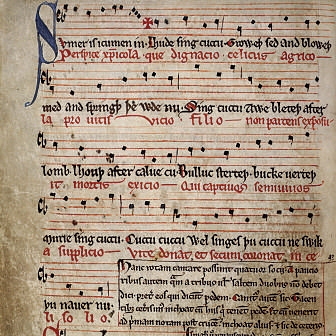
During the reign of the Norman King Henry II and his queen Eleanor of Aquitaine in the second half of the 12th Century, many more Francien words from central France were imported in addition to their Anglo-Norman counterparts (e.g. the Francien chase and the Anglo-Norman catch; royal and real; regard and reward; gauge and wage; guile and wile; guardian and warden; guarantee and warrant). Regarded as the most cultured woman in Europe, Eleanor also championed many terms of romance and chivalry (e.g. romance, courtesy, honour, damsel, tournament, virtue, music, desire, passion, etc).
Many more Latin-derived words came into use (sometimes through the French, but often directly) during this period, largely connected with religion, law, medicine and literature, including scripture, collect, meditation, immortal, oriental, client, adjacent, combine, expedition, moderate, nervous, private, popular, picture, legal, legitimate, testimony, prosecute, pauper, contradiction, history, library, comet, solar, recipe, scribe, scripture, tolerance, imaginary, infinite, index, intellect, magnify and genius. But French words continued to stream into English at an increasing pace, with even more French additions recorded after the 13th Century than before, peaking in the second half of the 14th Century, words like abbey, alliance, attire, defend, navy, march, dine, marriage, figure, plea, sacrifice, scarlet, spy, stable, virtue, marshal, esquire, retreat, park, reign, beauty, clergy, cloak, country, fool, coast, magic, etc.
A handful of French loanwords established themselves only in Scotland (which had become increasingly English in character during the early Middle English period, with Gaelic pushed further and further into the Highlands and Islands), including bonnie and fash. Distinctive spellings like “quh-” for “wh-” took hold (e.g. quhan and quhile for whan and while), and the Scottish accent gradually became more and more pronounced, particularly after Edward I’s inconclusive attempts at annexation. Scottish English’s radically distinct evolution only petered out in the 17th Century after King James united the crowns of Scotland and England (1603), and the influence of a strongly emerging Standard English came to bear during the Early Modern period.
Middle English After the Normans
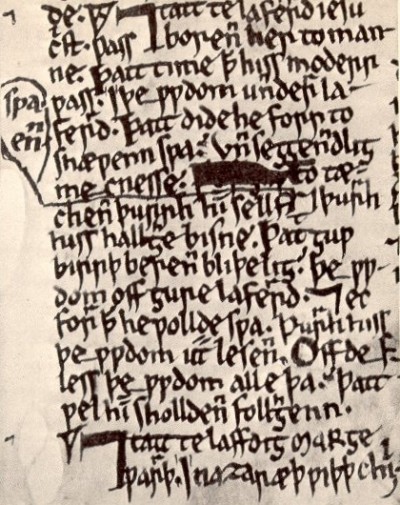
During these Norman-ruled centuries in which English as a language had no official status and no regulation, English had become the third language in its own country. It was largely a spoken rather than written language, and effectively sank to the level of a patois or creole. The main dialect regions during this time are usually referred to as Northern, Midlands, Southern and Kentish, although they were really just natural developments from the Northumbrian, Mercian, West Saxon and Kentish dialects of Old English. Within these, though, a myriad distinct regional usages and dialects grew up, and indeed the proliferation of regional dialects during this time was so extreme that people in one part of England could not even understand people from another part just 50 miles away.
The universities of Oxford and Cambridge were founded in 1167 and 1209 respectively, and general literacy continued to increase over the succeeding centuries, although books were still copied by hand and therefore very expensive. Over time, the commercial and political influence of the East Midlands and London ensured that these dialects prevailed (London had been the largest city for some time, and became the Norman capital at the beginning of the 12th Century), and the other regional varieties came to be stigmatized as lacking social prestige and indicating a lack of education. The 14th Century London dialect of Chaucer, although admittedly difficult, is at least recognizable to us moderns as a form of English, whereas text in the Kentish dialect from the same period looks like a completely foreign language.
It was also during this period when English was the language mainly of the uneducated peasantry that many of the grammatical complexities and inflections of Old English gradually disappeared. By the 14th Century, noun genders had almost completely died out, and adjectives, which once had up to 11 different inflections, were reduced to just two (for singular and plural) and often in practice just one, as in modern English. The pronounced stress, which in Old English was usually on the lexical root of a word, generally shifted towards the beginning of words, which further encouraged the gradual loss of suffixes that had begun after the Viking invasions, and many vowels developed into the common English unstressed “schwa” (like the “e” in taken, or the “i” in pencil). As inflectons disappeared, word order became more important and, by the time of Chaucer, the modern English subject-verb-object word order had gradually become the norm, and as had the use of prepositions instead of verb inflections.
| Middle English | Modern English |
|---|---|
| Þiss boc iss nemmnedd Orrmulum, | This book is named Ormulum, |
| Forr þi þatt Orrm itt wrohhte. | because Orm created it. |
| Icc hafe wennd inntill Ennglissh | I have turned into English |
| Goddspelless hallghe láre, | the Holy Gospels' lore, |
| Affterr þatt little witt þatt me | according to that little wit that |
| Min Drihhtin hafeþþ lenedd. | My Lord has granted me. |
- 1 Passage from *Ormulum*, late 12th century
The “Ormulum”, a 19,000 line biblical text written by a monk called Orm from northern Lincolnshire in the late 12th Century, is an important resource in this regard. Concerned at the way people were starting to mispronounce English, Orm spelled his words exactly as they were pronounced. For instance, he used double consonants to indicate a short preceding vowel (much as modern English does in words like diner and dinner, later and latter, etc); he used three separate symbols to differentiate the different sounds of the Old English letter yogh; and he used the more modern “wh” for the old-style “hw” and “sh” for “sc”. This unusual phonetic spelling system has given philologists an invaluable snap-shot of they way Middle English was pronounced in the Midlands in the second half of the 12th Century.
Many of Orm’s spellings were perhaps atypical for the time, but many changes to the English writing system were nevertheless under way during this period:
- the Old English letters ð (“edh” or “eth”) and þ (“thorn”), which did not exist in the Norman alphabet, were gradually phased out and replaced with “th”, and the letter Ȝ (“yogh”) was generally replaced with “g” (or often with “gh”, as in ghost or night);
- the simple word the (written þe using the thorn character) generally replaced the bewildering range of Old English definite articles, and most nouns had lost their inflected case endings by the middle of the Middle English period;
- the Norman “qu” largely substituted for the Anglo-Saxon “cw” (so that cwene became queen, cwic became quick, etc);
- the “sh” sound, which was previously rendered in a number of different ways in Old English, including “sc”, was regularized as “sh” or “sch” (e.g. scip became ship);
- the initial letters “hw” generally became “wh” (as in when, where, etc);
- a “c” was often, but not always, replaced by “k” (e.g. cyning/cyng became king) or “ck” (e.g. boc became bock and, later, book) or “ch” (e.g. cild became child, cese became cheese, etc);
- the common Old English “h” at the start of words like hring (ring) and hnecca (neck) was deleted;
- conversely, an “h” was added to the start of many Romance loanword (e.g. honour, heir, honest, habit, herb, etc), but was sometimes pronounced and sometimes not;
- “f” and “v” began to be differentiated (e.g. feel and veal), as did “s” and “z” (e.g. seal and zeal) and “ng” and “n” (e.g. thing and thin);
- “v” and “u” remained largely interchangeable, although “v” was often used at the start of a word (e.g. (vnder), and “u” in the middle (e.g. haue), quite the opposite of today;
- because the written “u” was similar to “v”, “n” and “m”, it was replaced in many words with an “o” (e.g. son, come, love, one);
- the “ou” spelling of words like house and mouse was introduced;
- many long vowel sounds were marked by a double letter (e.g. boc became booc, se became see, etc), or, in some cases, a trailing “e” became no longer pronounced but retained in spelling to indicate a long vowel (e.g. nose, name);
- the long “a” vowel of Old English became more like “o” in Middle English, so that ham became home, stan became stone, ban became bone, etc;
- short vowels were identified by consonant doubling (e.g siting became sitting, etc).
| Middle English | Modern English |
|---|---|
| Sumer is icumen in, | Summer is a-coming in |
| Lhude sing cuccu! | Loudly sing cuckoo! |
| Groweş sed and bloweş med | Groweth seed and bloweth mead |
| And springş şe wde nu, | and springs the wood anew |
| Sing cuccu! | Sing cuckoo! |
| Awe bleteş after lomb, | Ewe bleateth aft-er lamb, |
| Lhouş after calue cu. | Calf loweth after cow, |
| Bulluc sterteş, bucke uerteş, | Bullock starteth, buck farteth, |
| Murie sing cuccu! | Merry sing cuckoo! |
| Cuccu, cuccu, wel singes şu cuccu, | Cuckoo, cuckoo, well singest thou cuckoo, |
| Ne swik şu nauer nu! | Nor cease thou never now! |
| Sing cuccu nu, sing cuccu! | Sing cuckoo now, sing cuckoo! |
| Sing cuccu, sing cuccu nu! | Sing cuckoo, sing cuckoo now! |
- 1 'Sumer is icumen in' c. 1260
The “-en” plural noun ending of Old English (e.g. house/housen, shoe/shoen, etc) had largely disappeared by the end of the Middle English period, replaced by the French plural ending “-s” (the “-en” ending only remains today in one or two important examples, such as children, brethren and oxen). Changes to some word forms stuck while others did not, so that we are left with inconsistencies like half and halves, grief and grieves, speech and speak, etc. In another odd example of gradual modernization, the indefinite article “a” subsumed over time the initial “n” of some following nouns, so that a napron became an apron, a nauger became an auger, etc, as well as the reverse case of an ekename becoming a nickname.
Although Old English had no distinction between the formal and informal second person singular, which was always expressed as thou, the words ye or you (previously the second person plural) were introduced in the 13th Century as the formal singular version (used with superiors or non-intimates), with thou remaining as the familiar, informal form.
Resurgence of English
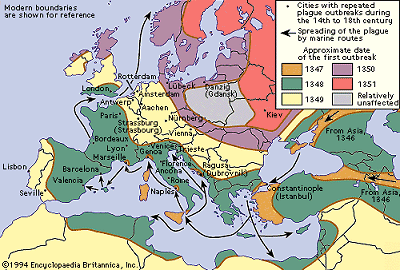
It is estimated that up to 85% of Anglo-Saxon words were lost as a result of the Viking and particularly the Norman invasions, and at one point the very existence of the English language looked to be in dire peril. In 1154, even the venerable “Anglo-Saxon Chronicle”, which for centuries had recorded the history of the English people, recorded its last entry. But, despite the shake-up the Normans had given English, it showed its resilience once again, and, two hundred years after the Norman Conquest, it was English not French that emerged as the language of England.
There were a number of contributing factors. The English, of necessity, had become “Normanized”, but, over time, the Normans also became “Anglicized”, particularly after 1204 when King John’s ineptness lost the French part of Normandy to the King of France and the Norman nobles were forced to look more to their English properties. Increasingly out of touch with their properties in France and with the French court and culture in general, they soon began to look on themselves as English. Norman French began gradually to degenerate and atrophy. While some in England spoke French and some spoke Latin (and a few spoke both), everyone, from the highest to the lowest, spoke English, and it gradually became the lingua franca of the nation once again.
The Hundred Year War against France (1337 – 1453) had the effect of branding French as the language of the enemy and the status of English rose as a consequence. The Black Death of 1349 – 1350 killed about a third of the English population (which was around 4 million at that time), including a disproportionate number of the Latin-speaking clergy. After the plague, the English-speaking labouring and merchant classes grew in economic and social importance and, within the short period of a decade, the linguistic division between the nobility and the commoners was largely over. The Statute of Pleading, which made English the official language of the courts and Parliament (although, paradoxically, it was written in French), was adopted in 1362, and in that same year Edward III became the first king to address Parliament in English, a crucial psychological turning point. By 1385, English had become the language of instruction in schools.
The following passage is taken from a late 14th Century work called “Mandeville’s Travels” about travels in foreign land:
In þat lond ben trees þat beren wolle, as þogh it were of scheep; whereof men maken clothes, and all þing þat may ben made of wolle. In þat contree ben many ipotaynes, þat dwellen som tyme in the water, and somtyme on the lond: and þei ben half man and half hors, as I haue seyd before; and þei eten men, whan þei may take hem. And þere ben ryueres and watres þat ben fulle byttere, þree sithes more þan is the water of the see. In þat contré ben many griffounes, more plentee þan in ony other contree. Sum men seyn þat þei han the body vpward as an egle, and benethe as a lyoun: and treuly þei seyn soth þat þei ben of þat schapp. But o griffoun hath the body more gret, and is more strong, þanne eight lyouns, of suche lyouns as ben o this half; and more gret and strongere þan an hundred egles, suche as we han amonges vs. For o griffoun þere wil bere fleynge to his nest a gret hors, Ȝif he may fynde him at the poynt, or two oxen Ȝoked togidere, as þei gon at the plowgh.
| Middle English | Modern English |
|---|---|
| Sişen şe sege and şe assaut watz sesed at troye | The siege and assault having ceased at Troy |
| Şe bor3 brittened and brent to brondez and askez | as its blazing battlements blackened to ash, |
| Şe tulk şat şe trammes of tresoun şer wro3t | the man who had planned and plotted that treason |
| Qatz tried for his tricherie şe trewest on erşe | had trial enough for the truest traitor! |
| Hit watz ennias şe athel and his highe kynde | Then Aeneas the prince and his honored line |
| Şat sişen depreced prouinces and patrounes bicome | plundered provinces and held in their power |
| Welne3e of al şe wele in şe west iles | nearly all the wealth of the western isles. |
| Fro riche romulus to rome ricchis hym swyşe | Thus Romulus swiftly arriving at Rome |
| With gret bobbaunce şat bur3e he biges vpon fyrst | sets up that city and in swelling pride |
| And neuenes hit his aune nome as hit now hat | gives it his name, the name it now bears; |
| Ticius to tuskan and teldes bigynnes | and in Tuscany Tirius raises up towns, |
| Langaberde in lumbardie lyftes vp homes | and in Lombardy Langoberde settles the land, |
| And fer ouer şe french flod felix brutus | and far past the French coast Felix Brutus |
| On mony bonkkes ful brode bretayn he settez | founds Britain on broad hills, and so bright hopes |
| Wyth wynne | begin, |
| Where werre and wrake and wonder | where wonders, wars, misfortune |
| Bi syşez hatz wont şerinne | and troubled times have been, |
| And oft boşe blysse and blunder | where bliss and blind confusion |
| Ful skete hatz skyfted synne | have come and gone again. |
- 1 Beginning of 'Sir Gawain and the Green Knight' (late 14th century)
There are clearly many more recognizable words in this sample than in the Old English passage, especially once the continued use of þ (“thorn”) to represent the sound “th” is accepted. Another now obsolete character Ȝ (“yogh”, more or less equivalent in most cases to the modern consonantal “y” as in yellow or sometimes like the “ch” in loch) is also used in this passage, and the letters “v” and “u” seem to be used more or less interchangeably (e.g. vpward for upward, ryueres for rivers, treuly for truly). The indications of a language in a state of flux are also apparent in the variety of spellings of the same words even within this short passage (e.g. contré and contree, þan and þanne, water and watres). Some holdovers from Old English inflections remain (e.g. present tense verbs still receive a plural inflection, as in beren, dwellen, han and ben), and many words still have the familiar medieval trailing “e” (e.g. wolle, benethe, suche, fynde, etc), but the overall appearance is much more modern than that of Old English.
Throughout the Middle English period, as in Old English, all the consonants were pronounced, so that the word knight, for example, would have been pronounced more like “k-neecht” (with the “ch” as in the Scottish loch) than like the modern English knight. By the late 14th Century, the final “e” in many, but not all, words had ceased to be pronounced (e.g. it was silent in words like kowthe and thanne, but pronounced in words like ende, ferne, straunge, etc).
Chaucer and the Birth of English Literature

Texts in Middle English (as opposed to French or Latin) begin as a trickle in the 13th Century, with works such as the debate poem “The Owl and the Nightingale” (probably composed around 1200) and the long historical poem known as Layamon’s “Brut” (from around the same period). Most of Middle English literature, at least up until the flurry of literary activity in the latter part of the 14th Century, is of unknown authorship.
Geoffrey Chaucer began writing his famous “Canterbury Tales” in the early 1380s, and crucially he chose to write it in English. Other important works were written in English around the same time, if not earlier, including William Langland’s “Piers Plowman” and the anonymous “Sir Gawain and the Green Knight”. But the “Canterbury Tales” is usually considered the first great works of English literature, and the first demonstration of the artistic legitimacy of vernacular Middle English, as opposed to French or Latin.
In the 858 lines of the Prologue to the “Canterbury Tales”, almost 500 different French loanwards occur, and by some estimates, some 20-25% of Chaucer’s vocabulary is French in origin. However, the overall sense of his work is very much of a re-formed English, a complete, flexible and confident language, more than adequate to produce great literature. Chaucer introduced many new words into the language, up to 2,000 by some counts – these were almost certainly words in everyday use in 14th Century London, but first attested in Chaucer’s written works. Words like paramour, difficulty, significance, dishonesty, edifice, ignorant, etc, are all from French roots, but when he wanted to portray the earthy working man of England (e.g. the Miller), he consciously used much more Old English vocabulary, and he also reintroduced many old words that had fallen out of favour, such as churlish, farting, friendly, learning, loving, restless, wifely, willingly, etc. The list of words first found in Chaucer’s works goes on: absent, accident, add, agree, bagpipe, border, box, cinnamon, desk, desperate, discomfit, digestion, examination, finally, flute, funeral, galaxy, horizon, infect, ingot, latitude, laxative, miscarry, nod, obscure, observe, outrageous, perpendicular, princess, resolve, rumour, scissors, session, snort, superstitious, theatre, trench, universe, utility, vacation, Valentine, village, vulgar, wallet, wildness, etc, etc.
| Middle English | Modern English |
|---|---|
| Whan that Aprill with his shoures soote | When fair April with his showers sweet, |
| The droghte of March hath perced to the roote, | Has pierced the drought of March to the root's feet |
| And bathed every veyne in swich licour | And bathed each vein in liquid of such power, |
| Of which vertu engendred is the flour, | Its strength creates the newly springing flower; |
| Whan Zephirus eek with his sweete breeth | When the West Wind too, with his sweet breath, |
| Inspired hath in every holt and heeth | Has breathed new life - in every copse and heath - |
| The tendre croppes, and the yonge sonne | Into each tender shoot, and the young sun |
| Hath in the Ram his halve cours yronne, | From Aries moves to Taurus on his run, |
| And smale foweles maken melodye, | And those small birds begin their melody, |
| That slepen al the nyght with open ye | (The ones who 'sleep` all night with open eye,) |
| (so priketh hem Nature in hir corages), | Then nature stirs them up to such a pitch |
| Thanne longen folk to goon on pilgrimages, | That folk all long to go on pilgrimage |
| And palmeres for to seken straunge strondes, | And wandering travellers tread new shores, strange strands, |
| To ferne halwes, kowthe in sondry londes; | Seek out far shrines, renowned in many lands, |
| And specially from every shires ende | And specially from every shire's end |
| Of Engelond to Caunterbury they wende, | Of England to Canterbury they wend |
| The hooly blisful martir for to seke, | The holy blessed martyr there to seek, |
| That hem hath holpen whan that they were seeke. | Who has brought health to them when they were sick. |
- 1 Beginning of the 'General Prologue' to Chaucer's 'Canterbury Tales'
Such was the pace of continuous change to the language at this time, that different forms of words were often used interchangeably, even by the same author, and this flexibility (or inconsistency) in spelling is quite noticeable in Chaucer’s work (e.g. yeer and yere, doughtren and doughtres, etc). However, it should be noted that, because Chaucer’s work was copied by several different scribes, and we have no original in Chaucer’s own hand, different manuscripts have different spellings, none of which are definitive (e.g. the same word is variously rendered as site, sighte, syth, sigh and cite in different manuscripts).
In 1384, John Wycliffe (Wyclif) produced his translation of “The Bible” in vernacular English. This challenge to Latin as the language of God was considered a revolutionary act of daring at the time, and the translation was banned by the Church in no uncertain terms (however, it continued to circulate unofficially). Although perhaps not of the same literary calibre as Chaucer (in general, he awkwardly retained the original Latin word order, for instance), Wycliffe’s “Bible” was nevertheless a landmark in the English language. Over 1,000 English words were first recorded in it, most of them Latin-based, often via French, including barbarian, birthday, canopy, child-bearing, communication, cradle, crime, dishonour, emperor, envy, godly, graven, humanity, glory, injury, justice, lecher, madness, mountainous, multitude, novelty, oppressor, philistine, pollute, profession, puberty, schism, suddenly, unfaithful, visitor, zeal, etc, as well as well-known phrases like an eye for an eye, woe is me, etc. However, not all of Wycliffe’s neologisms became enshrined in the language (e.g. mandement, descrive, cratch).
By the late 14th and 15th Century, the language had changed drastically, and Old English would probably have been almost as incomprehensible to Chaucer as it is to us today, even though the language of Chaucer is still quite difficult for us to read naturally. William Caxton, writing and printing less than a century after Chaucer, is noticeably easier for the modern reader to understand.
Essay Originally Published at https://www.thehistoryofenglish.com/middle-english.
